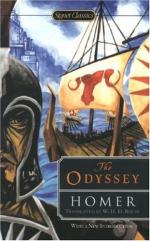“When I had set sail thence the wind took me first to Ismarus, which is the city of the Cicons. There I sacked the town and put the people to the sword. We took their wives and also much booty, which we divided equitably amongst us, so that none might have reason to complain. I then said that we had better make off at once, but my men very foolishly would not obey me, so they staid there drinking much wine and killing great numbers of sheep and oxen on the sea shore. Meanwhile the Cicons cried out for help to other Cicons who lived inland. These were more in number, and stronger, and they were more skilled in the art of war, for they could fight, either from chariots or on foot as the occasion served; in the morning, therefore, they came as thick as leaves and bloom in summer, and the hand of heaven was against us, so that we were hard pressed. They set the battle in array near the ships, and the hosts aimed their bronze-shod spears at one another. {76} So long as the day waxed and it was still morning, we held our own against them, though they were more in number than we; but as the sun went down, towards the time when men loose their oxen, the Cicons got the better of us, and we lost half a dozen men from every ship we had; so we got away with those that were left.
“Thence we sailed onward with sorrow in our hearts, but glad to have escaped death though we had lost our comrades, nor did we leave till we had thrice invoked each one of the poor fellows who had perished by the hands of the Cicons. Then Jove raised the North wind against us till it blew a hurricane, so that land and sky were hidden in thick clouds, and night sprang forth out of the heavens. We let the ships run before the gale, but the force of the wind tore our sails to tatters, so we took them down for fear of shipwreck, and rowed our hardest towards the land. There we lay two days and two nights suffering much alike from toil and distress of mind, but on the morning of the third day we again raised our masts, set sail, and took our places, letting the wind and steersmen direct our ship. I should have got home at that time unharmed had not the North wind and the currents been against me as I was doubling Cape Malea, and set me off my course hard by the island of Cythera.
“I was driven thence by foul winds for a space of nine days upon the sea, but on the tenth day we reached the land of the Lotus-eaters, who live on a food that comes from a kind of flower. Here we landed to take in fresh water, and our crews got their mid-day meal on the shore near the ships. When they had eaten and drunk I sent two of my company to see what manner of men the people of the place might be, and they had a third man under them. They started at once, and went about among the Lotus-eaters, who did them no hurt, but gave them to eat of the lotus, which was so delicious that those who ate of it left off caring about home, and did not even want to go back and say what had happened to them, but were for staying and munching lotus {77} with the Lotus-eaters without thinking further of their return; nevertheless, though they wept bitterly I forced them back to the ships and made them fast under the benches. Then I told the rest to go on board at once, lest any of them should taste of the lotus and leave off wanting to get home, so they took their places and smote the grey sea with their oars.




